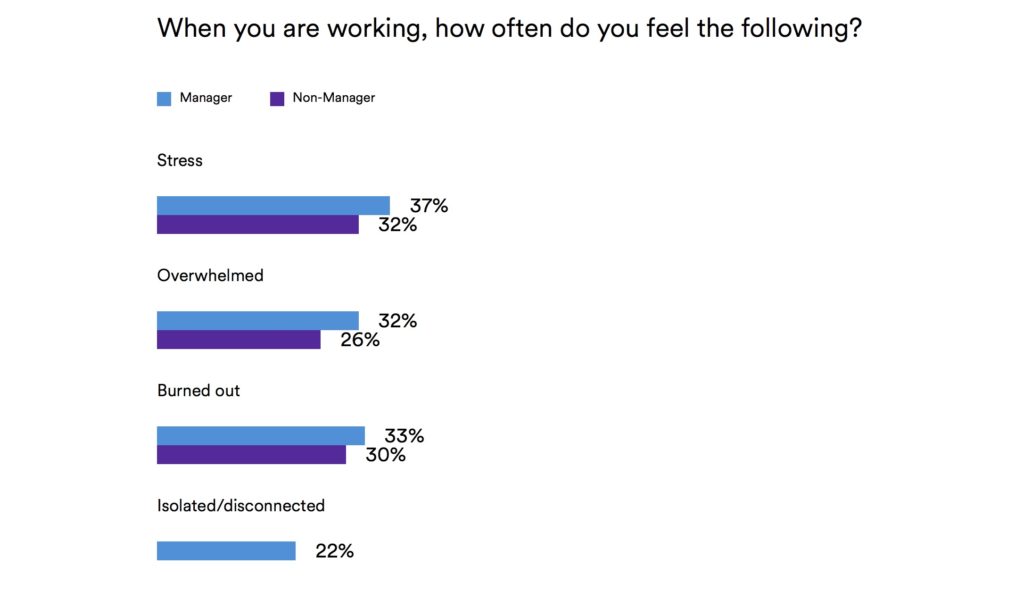Millennial managers are significantly more burnt out than managers of any other generation, a new study has revealed.
The new MetLife study found that 42% of Millennial managers, aged between 26 and 40, are significantly more likely to say they are burned out than Gen Z (34%), Gen X (27%) and Baby Boomers (21%). One driver could be the degree to which Millennial managers are stepping up to support their employees’ wellbeing, noted the report. As employers reimagine the workplace due to the significant impacts caused by the pandemic, managers – and particularly Millennial managers – have taken on the challenge of supporting employees’ wellbeing, even when it diminishes their own.
SUPPORTIVE MILLENNIAL MANAGERS
According to the MetLife study, 52% of employees with supportive Millennial managers say they are healthy across all four pillars of physical, financial, social and mental health; compared to just 18% of those who say their managers aren’t supportive.
“The pandemic has changed the way we work – from the way we do our jobs to how we interact with one another – and managers have been tasked with navigating this for their employees,” stated Missy Plohr-Memming, Senior Vice President, Group Benefits of MetLife. “As the largest generation in the workforce today, Millennials – and particularly those in management roles – have a significant impact on their organisation’s ability to succeed in the new normal.”
In a bid to foster strong employee performance, many Millennial managers are actually “sacrificing their own wellbeing”, the report highlighted. In fact, the study found a significant difference between those with and without supportive managers. For example, employees with supportive managers of any generation are notably more likely to feel productive (+46%), successful (+82%), engaged (+81%) and motivated (+110%); than those who lack managerial support.
This is especially true for employees with Millennial managers who report higher increases compared to those with managers from other generations in feeling productive (+58%), successful (+129%), engaged (+120%) and motivated (+140%); when they have a supportive versus a non-supportive manager.

OVERWHELMED & SQUEEZED MIDDLE
However, while organisations reap the benefits of strong managerial support, particularly Millennial manager support, through greater employee productivity and engagement, Millennial managers themselves are feeling squeezed. In fact, they are now feeling more overwhelmed, burnt out and stressed while working, compared to December 2020, confirmed the study.
As younger generations continue to move into management roles within the workforce, it’s imperative that employers provide them with training and tools; especially for Millennial managers who are already taking on the greater responsibility of ensuring the wellbeing of their teams, while managing their own.
According to the study, training and benefits are critical to Millennial managers’ wellbeing. In fact, Millennial managers and executives are more likely than other generations to want training and support in a number of key work areas. This includes people management (82%); managing personal stress (78%); conducting conversations around sensitive topics such as diversity and inclusion (D&I) and social justice (74%); and management of hybrid remote/onsite teams (74%).
Furthermore, the study found that Millennial managers who say their employer offers a range of benefits that meet their personal and household needs are significantly more likely to report being holistically healthy (54% compared to 30%) and resilient (70% compared to 46%).
MUST-HAVE BENEFITS
The specific benefits Millennial managers want as ‘must haves’ compared to pre-pandemic, include financial planning tools (+40%), pet insurance (+58%) and legal services (+50%).
“The effects of the pandemic have caused many employers to adjust their workplace policies and benefit programmes in real-time, and this will only continue,” highlighted Plohr-Memming. “As we reimagine the workforce of the future, employers must consider the varying needs of their managers; and what tools they may need for long-term success. Millennials, who will make up the majority of our future management, are eager for these skills and benefits for themselves and their teams.”
Click here for more information.
Another recent study revealed a dramatic rise in employee burnout, for both staff and leaders, illustrating an ‘ongoing’ and ‘stark’ crisis for companies. Click here to read more.








































